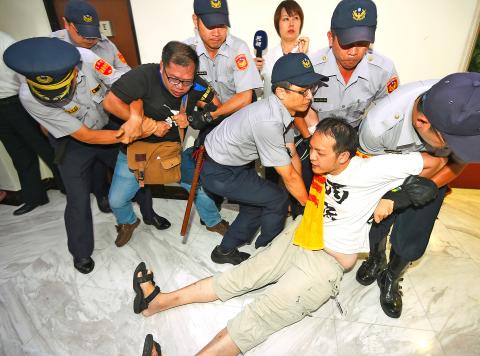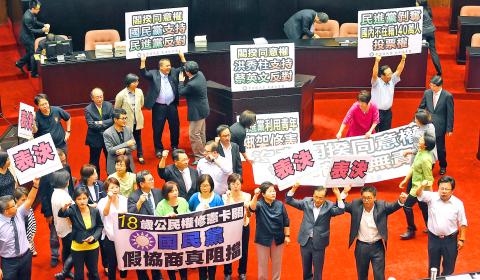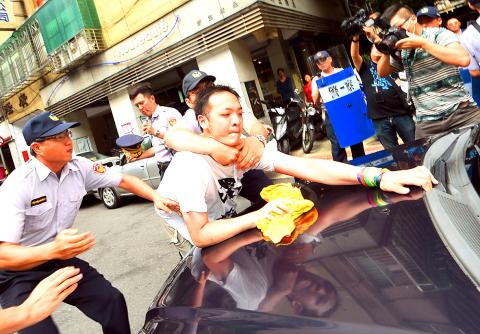Interparty negotiations over constitutional amendments broke down again yesterday, with young protesters, angry over the Chinese Nationalist Party’s (KMT) refusal to separately review controversial amendments on the last day of the legislative session, attempting to storm into KMT caucus whip Lai Shyh-bao’s (賴士葆) office.
The Legislative Yuan had its last plenary meeting yesterday, which was already extended for the legislature to pass the amendments in time for a referendum on the reforms to take place alongside the presidential and legislative elections on Jan. 16. The failure to pass the amendments means the referendum will not take place as planned.
The party caucuses held negotiations yesterday morning intending to iron out the disagreements on how the constitutional amendments should be handled.

Photo: Chang Chia-ming, Taipei Times
The Democratic Progressive Party (DPP) caucus said it proposed that constitutional amendments on which the parties have reached a consensus, such as the lowering of the voting age to 18 and the lowering of the threshold for parties to secure representation in the legislature, be passed in time for the administrative procedures required by the referendum.
It accused the KMT caucus of lacking sincerity with its insistence on bundling amendments for simultaneous legislative passage.
DPP caucus whip Ker Chien-ming (柯建銘) said Lai stressed that it was the KMT leadership pressing for the bundling of the legislature’s power to confirm the premier and absentee voting — the two items that the KMT believes to be the most pressing, but which the DPP opposes — with the lowering of the voting age.

Photo: Chang Chia-ming, Taipei Times
Ker alleged that Lai even proposed a delay to the presidential election — but not the legislative election — which would relieve the pressure for prompt passage of the constitutional amendments, because the referendum, which has to be scheduled on the same day as the elections to guarantee a 50 percent voter turnout for the vote to be valid, could then be postponed to be held with the rescheduled presidential election.
Ker said the KMT, which is likely to nominate Deputy Legislative Speaker Hung Hsiu-chu (洪秀柱) as its presidential candidate, expects a significant challenge for KMT legislative candidates (especially in the south), and that postponing the presidential election — which could allow at least another month for interparty negotiations on the constitutional amendments — would likely reduce Hung’s impact on the legislative election for KMT candidates.
Lai denied proposing the postponement, saying it was put forward by People First Party Legislator Thomas Lee (李桐豪), who, according to Lai, asked DPP Chairperson and presidential candidate Tsai Ing-wen (蔡英文) to promise that she would support allowing the legislature to confirm the premiership.

Photo: Chang Chia-ming, Taipei Times
Lai added that legislative regulations state that bills, unless already having a consensus, could not be put to a vote within one month of negotiations.
A group of young people walked into the building housing legislators’ offices early yesterday afternoon and demanded that Lai answer questions on the issue.
After a standoff with police outside Lai’s office, they were thrown out, with protester Wang Yi-kai (王奕凱) arrested on charges of assault on a police officer.
The protesters demanded to see evidence of Wang’s offense, but said it was not provided.
The police escorted Wang to a patrol car and were able to leave only after a confrontation, in which the protesters blocked the car by lying down in front of it.
DPP Legislator Yu Mei-nu (尤美女) later said that KMT lawmakers failed to appear at an interparty negotiation session scheduled for the afternoon, adding that Lai told her that negotiations were not possible, because of a party leadership directive.
The last general assembly meeting ended at about 6pm, with lawmakers from both parties holding banners and shouting slogans denouncing each other for obstructing the constitutional reforms.

AGING: As of last month, people aged 65 or older accounted for 20.06 percent of the total population and the number of couples who got married fell by 18,685 from 2024 Taiwan has surpassed South Korea as the country least willing to have children, with an annual crude birthrate of 4.62 per 1,000 people, Ministry of the Interior data showed yesterday. The nation was previously ranked the second-lowest country in terms of total fertility rate, or the average number of children a woman has in her lifetime. However, South Korea’s fertility rate began to recover from 2023, with total fertility rate rising from 0.72 and estimated to reach 0.82 to 0.85 by last year, and the crude birthrate projected at 6.7 per 1,000 people. Japan’s crude birthrate was projected to fall below six,

US President Donald Trump in an interview with the New York Times published on Thursday said that “it’s up to” Chinese President Xi Jinping (習近平) what China does on Taiwan, but that he would be “very unhappy” with a change in the “status quo.” “He [Xi] considers it to be a part of China, and that’s up to him what he’s going to be doing, but I’ve expressed to him that I would be very unhappy if he did that, and I don’t think he’ll do that. I hope he doesn’t do that,” Trump said. Trump made the comments in the context

SELF-DEFENSE: Tokyo has accelerated its spending goal and its defense minister said the nation needs to discuss whether it should develop nuclear-powered submarines China is ramping up objections to what it sees as Japan’s desire to acquire nuclear weapons, despite Tokyo’s longstanding renunciation of such arms, deepening another fissure in the two neighbors’ increasingly tense ties. In what appears to be a concerted effort, China’s foreign and defense ministries issued statements on Thursday condemning alleged remilitarism efforts by Tokyo. The remarks came as two of the country’s top think tanks jointly issued a 29-page report framing actions by “right-wing forces” in Japan as posing a “serious threat” to world peace. While that report did not define “right-wing forces,” the Chinese Ministry of Foreign Affairs was

PREPAREDNESS: Given the difficulty of importing ammunition during wartime, the Ministry of National Defense said it would prioritize ‘coproduction’ partnerships A newly formed unit of the Marine Corps tasked with land-based security operations has recently replaced its aging, domestically produced rifles with more advanced, US-made M4A1 rifles, a source said yesterday. The unnamed source familiar with the matter said the First Security Battalion of the Marine Corps’ Air Defense and Base Guard Group has replaced its older T65K2 rifles, which have been in service since the late 1980s, with the newly received M4A1s. The source did not say exactly when the upgrade took place or how many M4A1s were issued to the battalion. The confirmation came after Chinese-language media reported